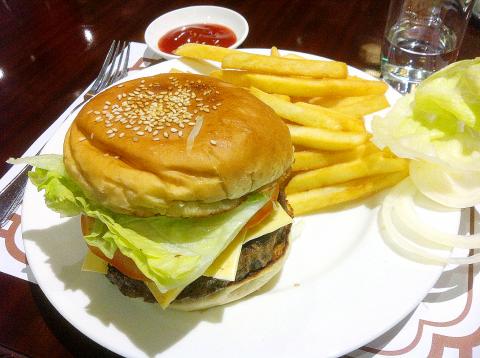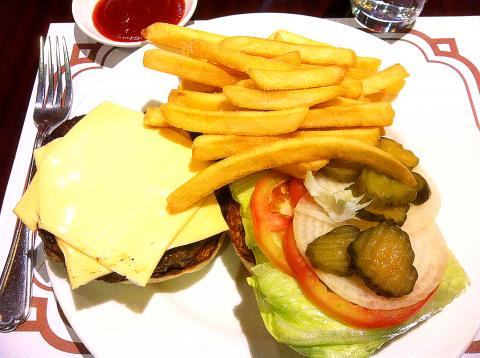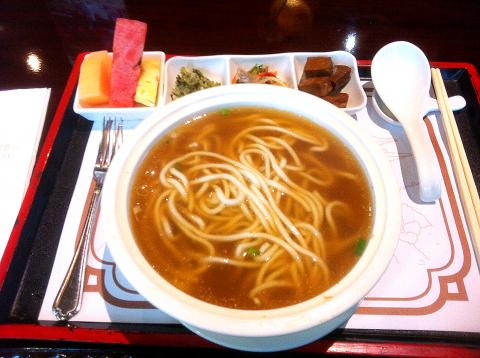It turns out that you can get a decent burger at The Grand Hotel, if you don’t mind paying a little extra.
The grand beef burger served by the hotel’s Grand Garden Restaurant (松鶴廳) might not live up to the name for those expecting five-star gourmet fare, but I found NT$390 to be a fair price. It soothed my homesickness for a burger at a greasy spoon diner in the US.
The restaurant’s version comes with the classic trimmings: plain iceberg lettuce, a few tomato slices, raw onion and pickles (strangely called “Chinese pickles” on the menu). The burger I had on my visit a few weeks ago was not absolute perfection –– the processed cheese slices weren’t melted onto the patty — but I certainly appreciated other simple details, such as the fact that the bun was buttered and toasted. And the crispy fries also helped me relive those good old late nights at cheap American diners. (A side note: tell the waiter your preference for how you want the burger done, as they won’t ask).

Photo: David Chen, Taipei Times
Now, for the same price and even less, you can get a fancier, and better quality burger at places like KGB on Taipei’s Shida Road (師大路). But consider that at the Grand Hotel, you’re also paying for the “view.” The Grand Garden Restaurant is located on the first floor, on the left side of the main lobby. Patrons sit in plush chairs, which allow you to kick back and marvel at the life-sized, bright red pillars that stand about the room and the beautiful, ornate wooden marquetry that fills nearly every inch of the high ceilings.
There is an anachronistic, almost kitschy feel to the Grand Hotel lobby, whose fading five-star glory has been eclipsed by the modern, swanky hotels of the capital’s East District (東區). The gigantic touchscreen guides for guests look goofy and out-of-place; much of the furniture is aging; the restaurant’s wait staff, though attentive, seem poorly trained. Still, none of this detracts from the magnificence of the lobby’s wide-open interior.
The Grand Garden’s a la carte menu is a mix of simple Western and Asian meals. Sandwich choices include BLT (NT$290), tuna croissant (NT$340) and croque monsieur (NT$320). Beverages are ridiculously overpriced. Plain coffee is NT$180, while a single shot espresso is NT$200. You can get coffee, tea or juice as part of the meals, including the burger and spaghetti bolognese (NT$390). For Asian choices, there’s fried rice or fried noodles and spicy curry chicken or beef with rice, all at NT$390 each. The beef noodle soup (牛肉麵, NT$390) is not too bad and comes in a large portion, but it’s not worth the price if you’ve got a hankering for good beef noodles. Save your money and spend it at one of the many award-winning places in town.

Photo: David Chen, Taipei Times
The Grand Garden is actually split into two areas –– the section in the front of the lobby is for diners who order a la carte. The area toward the back of the lobby offers an all-you-can-eat buffet. The spread includes both Asian and Western choices, and costs NT$780 for lunch and NT$890 for dinner. On weekends, those prices go up by NT$100.
Though there are free shuttle buses to the Grand Hotel from Yuanshan MRT Station (圓山捷運站), day-trippers might consider making a short hike to work up an appetite. The hotel can be reached on foot via the Qinshan Hiking Trail (親山步道), which starts on Zhongshan North Road (中山北路) near Jiantan MRT Station (劍潭捷運站). The walk uphill should take no more than 10 minutes and the path leads to a parking lot at the side of the hotel.

Photo: David Chen, Taipei Times

April 14 to April 20 In March 1947, Sising Katadrepan urged the government to drop the “high mountain people” (高山族) designation for Indigenous Taiwanese and refer to them as “Taiwan people” (台灣族). He considered the term derogatory, arguing that it made them sound like animals. The Taiwan Provincial Government agreed to stop using the term, stating that Indigenous Taiwanese suffered all sorts of discrimination and oppression under the Japanese and were forced to live in the mountains as outsiders to society. Now, under the new regime, they would be seen as equals, thus they should be henceforth

Last week, the the National Immigration Agency (NIA) told the legislature that more than 10,000 naturalized Taiwanese citizens from the People’s Republic of China (PRC) risked having their citizenship revoked if they failed to provide proof that they had renounced their Chinese household registration within the next three months. Renunciation is required under the Act Governing Relations Between the People of the Taiwan Area and the Mainland Area (臺灣地區與大陸地區人民關係條例), as amended in 2004, though it was only a legal requirement after 2000. Prior to that, it had been only an administrative requirement since the Nationality Act (國籍法) was established in

Three big changes have transformed the landscape of Taiwan’s local patronage factions: Increasing Democratic Progressive Party (DPP) involvement, rising new factions and the Chinese Nationalist Party’s (KMT) significantly weakened control. GREEN FACTIONS It is said that “south of the Zhuoshui River (濁水溪), there is no blue-green divide,” meaning that from Yunlin County south there is no difference between KMT and DPP politicians. This is not always true, but there is more than a grain of truth to it. Traditionally, DPP factions are viewed as national entities, with their primary function to secure plum positions in the party and government. This is not unusual

US President Donald Trump’s bid to take back control of the Panama Canal has put his counterpart Jose Raul Mulino in a difficult position and revived fears in the Central American country that US military bases will return. After Trump vowed to reclaim the interoceanic waterway from Chinese influence, US Defense Secretary Pete Hegseth signed an agreement with the Mulino administration last week for the US to deploy troops in areas adjacent to the canal. For more than two decades, after handing over control of the strategically vital waterway to Panama in 1999 and dismantling the bases that protected it, Washington has